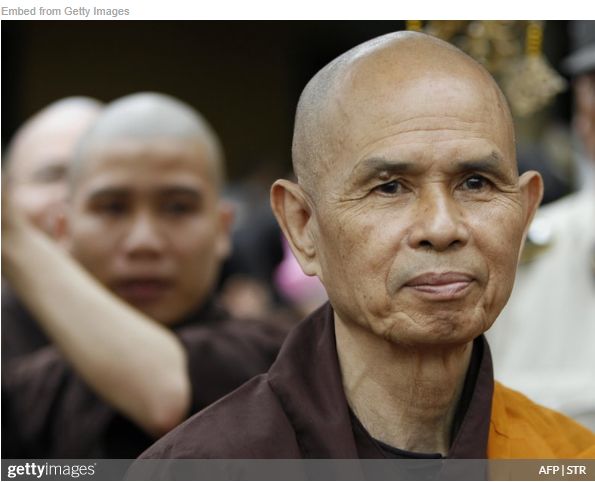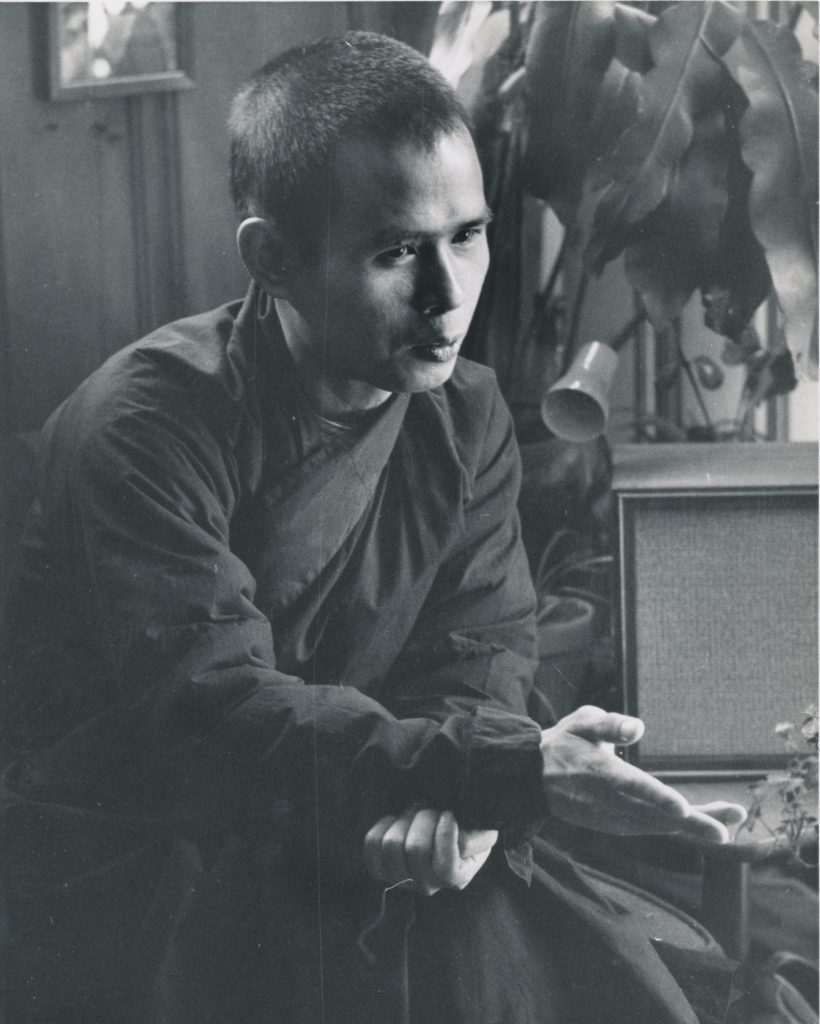Physical Address
304 North Cardinal St.
Dorchester Center, MA 02124
Physical Address
304 North Cardinal St.
Dorchester Center, MA 02124

The renowned 95-year-old Vietnamese Buddhist monk Thich Nhat Hanh has passed away, leaving behind a legacy of interconnection.Article by Paul R. Dekar from The Fellowship of Reconciliation Born on October 11, 1926 in the city of Hue in Central Vietnam, renowned Buddhist monk Thich Nhat Hanh was 95 years old when he passed away on Jan. 22. Author of over a hundred books, Nhat Hanh’s legacy is one of interconnection with one’s true self, others, nature and beyond…

In Chicago, Nhat Hanh met Martin Luther King Jr., to whom he had written a letter on the meaning in Mahayana Buddhism of self-immolation. The two men held a press conference. The Chicago Tribune reported that King compared the civil rights movement in the United States with the protest of Vietnamese monks against the war. In 1967, King nominated Nhat Hanh for the Nobel Peace Prize. In his letter to the Nobel committee, King argued that Nhat Hanh offered a way out of the nightmare. King explained that he knew no one more worthy of recognition than this gentle Buddhist monk from Vietnam, who he was privileged to call a friend. On April 4, 1967, King spoke at Riverside Church in New York City where he repeated his opposition to the Vietnam War and cited Nhat Hanh. A year later, after speaking in Memphis, Tennessee, King planned to continue to the Abbey of Gethsemani in Kentucky to join Nhat Hanh and Thomas Merton on retreat. All three practiced meditation for their spiritual fulfillment and that of others. Each sought to help others to live compassionately. One can only imagine how their dialogue might have ensued had King not been murdered April 4, 1968.

Subsequently, Nhat Hanh deepened his “engaged Buddhism” a term he coined at a time when his country was being ravaged by the Vietnam War. Among 14 principles, engaged Buddhists have sought to speak truthfully and constructively; not to use the Buddhist community for personal gain or profit; to live with a vocation that harms neither humans nor nature, and to live in accord with the ideals of compassion, protection of life and prevention of war. During the early 1970s, Nhat Hanh served on FOR’s advisory council and staff. With FOR leader Alfred Hassler and Chan Khong, who had followed Nhat Hanh into exile, Nhat Hanh co-founded Dai Dong The Gioi, Chinese for “a world of great happiness.” This was an effort to link the global challenges of war, environmental degradation and poverty at a time of growing awareness of climate crisis. The United Nations organized two international conferences: the Biosphere Conference in Paris in 1968 and the U.N. Conference on Human Environment, which took place in Stockholm, Sweden in 1972. Dai Dong organized an alternative conference that sought to dramatize the depth and scope of existing world issues in such a way that it would be impossible for national delegations to ignore the crisis and of the urgency to make social and political changes necessary to realize the idea of a world community. During this period, Nhat Hanh lived in France. In 1978, Nhat Hanh inspired creation of a Buddhist Peace Fellowship, one of FOR’s religious peace groups. According to its website, “we continue to learn from Thich Nhat Hanh and benefit from the thousands of people who come to engaged Dharma practice through his teaching.” (Thich is an honorific title meaning venerable.) Working with his Vietnamese Buddhist colleagues, Nhat Hahn sought to help war victims, including boat people who came to the United States. He also wrote several books, two of which were published by FOR: “The Miracle of Being Awake” was published in 1975 followed, in 1987, by “Be Still and Know. Meditation for Peacemaker,” which was co-published with Pax Christi. FOR also recorded an album titled “Cry of Vietnam: Three Vietnamese Voices That Cannot Be Silenced.”

Uncertain how next to proceed, Nhat Hanh entered a period of withdrawal. For five years, he lived at a hermitage in France where he meditated, wrote, gardened and received occasional visitors. After 1983, Nhat Hanh’s vocation became more public. He helped form Plum Village in southwestern France. Characterized as a community of mindful living, Plum Village gathered people in conflict such as Palestinians and Israelis for peacebuilding retreats. Encouraging people to live mindfully and compassionately, Nhat Hanh lectured and led retreats around the world. On September 28, 2002, Nhat Hanh, Chan Khong and 45 members of Plum Village visited Memphis, Tennessee. As part of a wider effort to build opposition to impending U.S. war in Iraq, Nhat Hanh led a mindful walk, ate a mindful lunch, and gave a talk as part of what organizers called PeaceWalk 2002. Nhat Hanh explained to the gathering that practicing peace means being peace in such everyday aspects of living as walking and eating. During his talk, Nhat Hanh encouraged peacemakers to practice mindfulness by walking or eating silently in the present. He said such practices are essential to uproot seeds of war that germinate in one’s being. To prevent war in the future, we have to practice mindfulness today. Only by establishing peace in our hearts and in our ways of looking at things can we begin to deal with sources of violence and war such as anger, fear, hatred, misunderstanding and possessiveness. Nhat Hanh taught participants the following chant, “I Have Arrived,” which goes: I have arrived / I am home / in the here / and in the now. I have arrived / I am home / in the here / and in the now. I am solid. / I am free. / I am solid. / I am free. In the ultimate I dwell. / In the ultimate I dwell. Nhat Hanh stressed that during the war in Vietnam, people in the United States suffered just as much as the Vietnamese. In a poem, “Call Me by My True Names,” Nhat Hanh illustrated radical empathy by recognizing himself in a frog and in the snake that eats it, then in a starving child in Uganda and in the arms merchant who sells deadly weapons there. Finally he identified himself in a 12-year-old girl raped by a sea pirate and also in a sea pirate, whose heart the United States is not yet capable of seeing and loving. Darkness, he explained, cannot be dissipated by more darkness. Only understanding and compassion can dissolve fear, hatred and violence. One concrete outcome of PeaceWalk2002 was the decision of participants to create Magnolia Grove Monastery, a 120-acre residential monastery and mindfulness practice center in northwest Mississippi. A year later, Nhat Hanh returned for its opening. Ever since, Magnolia Grove Village has served as a place to rest with the present moment and to live peacefully. In 2005, following lengthy negotiations, the Vietnamese government granted Nhat Hanh permission to return to his birth country. He taught, published four of his books in Vietnamese, and traveled with monastic and lay members of his order. In 2007, he returned to Vietnam. The goals of these trips were to support new monastics in his order and to organize and conduct “Great Chanting Ceremonies.” These were intended to help heal wounds remaining from the Vietnam War. He continued to emphasize that — with our capacity of smiling, breathing and being peace — humans can make peace, be peace and do something to change the course of things.In 2014, Nhat Hanh suffered a stroke at Plum Village, the monastery and retreat center in France that has been his home for over 30 years. He received treatment in San Francisco and France. Though he was unable to speak after the stroke, he continued to lead the community, using his left arm and facial expressions to communicate. In October 2018, Nhat Hahn returned permanently to Vietnam. Mark Nguyen, one of the organizers of PeaceWalk 2002, visited Nhat Hahn in December 2018. Chan Khong took Mark to see Nhat Hahn through a window. Sitting inside looking out at Mark, Nhat Hahn acknowledged Mark with a slight nod. By all accounts, his health was remarkably stable. Nhat Hanh offers a way of seeing ourselves and of looking at things that leads to diminished aggression, fear and hatred. He urges us to rely on each other and to seek to ensure that our children have a future. In his words, “Every day we do things, we are things that have to do with peace. If we are aware of our life, our way of looking at things, we will know how to make peace right in the moment.”